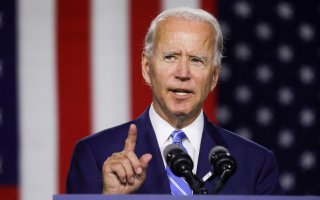Joe Biden Should Not Spurn U.S. Allies in the Afghanistan Peace Process
Instead of blunt threats, Afghanistan’s delicate situation necessitates a gentle approach.
Afghanistan is a crowded battlefield, from non-state armed factions to foreign powers. In addition, the search for peace is literally akin to looking for a needle in a haystack. The great powers and regional states have invested in one or more militant groups. Afghan state institutions, meanwhile, are marred by incompetence, corruption, and nepotism. In addition, political opportunism is rife in Afghanistan leading to power struggles between different political actors, like what is witnessed in many other countries. The state institutions are in shambles while security forces remain ill-trained, fragmented, and often penetrated by militant sympathizers or foreign intelligence personnel. Yet, despite these concerning realities, there is an urgency to withdraw U.S. troops by May 1, as set by the former Trump administration. It is President Joe Biden’s conundrum now!
If Iran and North Korea are America’s migraines, Afghanistan is its gangrene. The former U.S. administration opted to chop off the infected area by withdrawing U.S. troops and leaving the Taliban and the fragile Afghan government (and its security forces) to sort out the mess. It pressured Pakistan to facilitate as much as possible but discounted the counterproductive activities of various foreign states. China has the highest foreign investment in the war-torn country, while Russia, Iran and India are busy settling strategic scores with their rivals. Hidden beneath sophisticated terms, stability and development are agendas pursued by various foreign states to feed lawlessness through their political and militant proxies in Afghanistan.
After over fifty days in the White Office, U.S. Secretary of State Antony Blinken wrote to President Ashraf Ghani and Chief Executive Officer Abdullah Abdullah, demanding them to show “the urgent leadership that President Biden and I ask of you in the coming weeks.” The leaked letter categorically stated that Washington is “considering the full withdrawal of our forces by May 1st.”
Afghanistan’s Vice President Amrullah Saleh bluntly reacted, “Our dependency on the outside world does not mean we obey illegitimate demands.”
Another striking point in the letter is the U.S. proposal for the United Nations to convene a multinational meeting involving envoys from Moscow, Beijing, New Delhi, Tehran, Islamabad, and Washington. Ankara has agreed to hold a meeting between the Afghan government and the Taliban on March 27. The Taliban has expectedly turned down the ceasefire offer and released a training video showing militants preparing for the “Spring Offensive.”
The Afghan government has reservations concerning the proposals contained in the letter, while Pakistan is wary of Washington’s new approach and inclusion of other actors like India and Iran. Zalmay Khalilzad, the Trump-era special envoy for Afghanistan who has kept his position, has a tough job ahead to undo what he achieved which was celebrated with fanfare.
The Biden administration’s review of U.S. policy towards Kabul is seemingly influenced by external forces other than merely U.S. national interests. No doubt that the forty-sixth president is by far the most experienced politician on foreign policy matters, resurrecting the Afghan peace process from the ashes of the February 2020 Doha Accord will not be a walk in the park. The May 1 withdrawal deadline is far from realistic when taking into consideration various factors such as stability in the country. However, it is important to mention that 2,500 U.S. troops are too little to help Afghan national security agencies in maintaining law and order in the country. In case of a pullout, the power vacuum will be filled by foreign-aided non-state actors, with those aligned to Iran and Russia already having made significant inroads.
Blinken's letter falls short of the astute diplomacy expected from a seasoned politician. The Taliban are unlikely to accept a ceasefire offer, especially when the United States is refusing to comply with the Doha Accord. The threat of withdrawing U.S. troops is unviable as the complex process outlined in Blinken’s letter is far from commencing. The invitation to Iran opens a pandora’s box as the Gulf states will see it as a U.S. attempt to appease Tehran despite its destabilizing behavior in Afghanistan and elsewhere in the Middle East. India’s presence at the negotiating table will anger Pakistan for understandable reasons. It is equally mystifying as to why an intra-Afghan meeting cannot be held in Doha instead of Turkey. Is the Biden administration too allergic to the Gulf states, that can be abandoned for strategic advantages elsewhere?
Saudi Arabia has stood by the United States since the Soviet invasion of Afghanistan. The price the kingdom has paid is enormous and intangible. It still has immense influence in the war-ravaged country that it has exploited to facilitate the peace process. Let us not forget the fact that the reconstruction process requires mammoth financial and political support from the Gulf states. To sideline them to appease a radical and war-mongering state appears to be the outcome of Tehran’s successful blackmail tactics. From harboring Al Qaeda and Taliban leaders to stoking sectarian fires in Afghanistan, what merits Iran’s role in the Afghan peace process?
Instead of blunt threats, Afghanistan’s delicate situation necessitates a gentle approach. Saudi Arabia, the United Arab Emirates, and Pakistan along with other countries can help the United States achieve what it could not during the never-ending war. There is no doubt, that the Biden administration has the right to review U.S. policies towards Afghanistan and the Middle East. However, blowtorch diplomacy will not be fruitful, instead, it will lead to further difficulties, dilemmas, and challenges for the new administration in the short and long term.
Dr. Mohammed Al-Sulami is the founder and president of the International Institute for Iranian Studies (Rasanah) based in Riyadh, KSA. He tweets @mohalsulami.
Image: Reuters.


